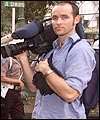 KANDAHAR - For any of us doing potentially dangerous work, the death of a colleague is a sobering and tragic experience. Whether you deliver life saving food and shelter to the innocent victims of violence, or provide information to the comfortable classes of the west, you don't expect to die.
KANDAHAR - For any of us doing potentially dangerous work, the death of a colleague is a sobering and tragic experience. Whether you deliver life saving food and shelter to the innocent victims of violence, or provide information to the comfortable classes of the west, you don't expect to die. If you're lucky, you have been formally trained to cope with what are known as hostile environments. On the long list of inadequate euphemisms dreamt up by bureaucrats, that one sits near the top. Taking such a course means-for most of us in the media-going to the English countryside for a weekend of war stories, too much alcohol and a staged kidnapping by ex special forces soldiers.
It's not the sort of thing that prepares you for much, let alone life threatening situations.
I doubt that such training was much help to the late Henry Burton of Reuters news agency, who along with three colleagues are the latest media victims of this wretched war in Afghanistan. Henry, his cameraman and two others were dragged from a car as it drove through a nasty bit of territory east of Kabul. It was always a bad stretch of road, we old Afghan hands said when we heard the news. That's small comfort to anyone, but it was something we had to say.
Frighteningly, it seems as if the four victims of this atrocity were singled out because they were journalists, representatives of a western media that has few friends in Afghanistan at the moment. We'll probably never know who killed them, it could have been rogue Taleban or Northern Alliance fighters, bandits, or al-Qaeda supporters from the Middle East-it really doesn't matter. There's no shortage in this country, or anywhere else, of people willing to resort to murder to settle scores, real or imagined. It seems as if the Reuters people fell victim to that.
We got the chilling news from the east here in Taleban-controlled southern Afghanistan as it happened. Along with 120 other journalists, I'm a slightly unwilling guest of the retreating Islamic militia at the moment. Belatedly, it seems as if the Taleban wanted to get its message out before it fades from the maps of Afghanistan. So in a chaotic frenzy, journalists sought and fought over visas to come here. All thoughts of safety and security were secondary to getting here. The nature of the beast, but not a very encouraging sign of our maturity. The deaths elsewhere in the country gave us all a reality check, but it didn't last long. In Spin Boldak, amid sprawling refugee camps and smugglers bazaars the world's press is gathered to cover the Taleban's last stand. It's an alluring story and many here have waited a long time for the merest glimpse inside the minds of the militia that has ruled Afghanistan for the past five years. The turbaned men and boys with Kalashnikovs have a disarming simplicity and sense of humour. They laugh and joke when you take their photograph. They clutch their rifles fiercely on demand. They talk wistfully of how the dreariness and violence of this life will soon give way to the pleasures and seductions of the next.
 Meanwhile, their leaders shout into walkie-talkies and generally behave like part of a regime that's on its last legs. In the market, contraband dealers and truck drivers tell you they're used to authority rising and collapsing on a fairly regular basis. Eventually, they say, each new government makes its deal with the smugglers and life goes on. Today the Taleban, tomorrow some other group, that has as many drawbacks for the people of Afghanistan. And here we are covering it all.
Meanwhile, their leaders shout into walkie-talkies and generally behave like part of a regime that's on its last legs. In the market, contraband dealers and truck drivers tell you they're used to authority rising and collapsing on a fairly regular basis. Eventually, they say, each new government makes its deal with the smugglers and life goes on. Today the Taleban, tomorrow some other group, that has as many drawbacks for the people of Afghanistan. And here we are covering it all. Is this what being a journalist is all about? It's a question we can no longer ask Henry Burton.



